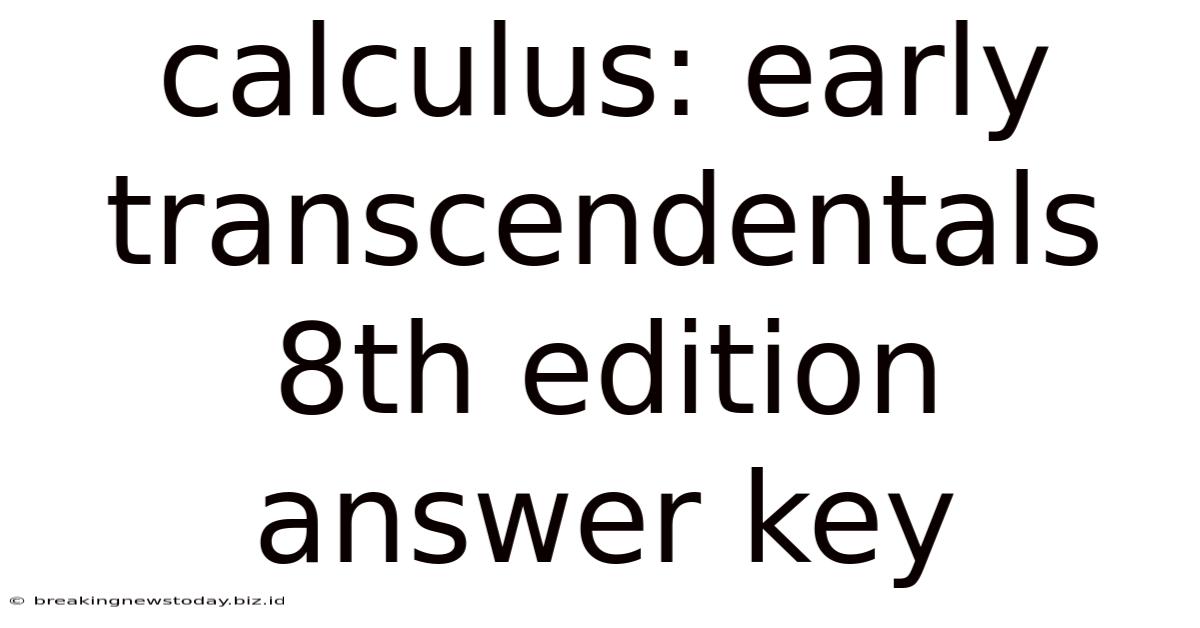Calculus: Early Transcendentals 8th Edition Answer Key
Breaking News Today
May 09, 2025 · 4 min read

Table of Contents
Calculus: Early Transcendentals 8th Edition Answer Key: A Comprehensive Guide
Finding a reliable answer key for a challenging textbook like "Calculus: Early Transcendentals, 8th Edition" can be a game-changer for students. This guide provides insights into effective study strategies, the importance of understanding concepts over rote memorization, and resources to help you navigate the complexities of calculus. While a complete answer key isn't readily available online for ethical and copyright reasons, this article will equip you with the tools and strategies to master the material.
Understanding the Importance of Conceptual Mastery
Before diving into solutions, it's crucial to emphasize the importance of understanding the underlying concepts. Simply memorizing answers without grasping the "why" behind them will hinder your long-term learning and problem-solving abilities. Calculus, with its intricate theorems and applications, demands a deep understanding of fundamental principles.
Active Learning Strategies:
- Engage with the Material: Don't just passively read the textbook. Actively participate by working through examples, attempting problems before looking at solutions, and making notes.
- Visualize Concepts: Calculus often involves visualizing functions, curves, and areas. Use graphs, diagrams, and geometric interpretations to aid your understanding.
- Break Down Complex Problems: Divide complex problems into smaller, manageable parts. Tackle each step individually, building your understanding incrementally.
- Seek Clarification: Don't hesitate to ask questions. Consult your professor, teaching assistant, or classmates if you encounter difficulties. Utilize online forums or tutoring services for additional support.
- Practice, Practice, Practice: Consistent practice is key to mastering calculus. Work through a wide range of problems, from simple to challenging, to build your skills and confidence.
Utilizing Available Resources
While a full answer key might be elusive, several resources can significantly aid your learning journey:
Textbook Resources:
- Examples and Worked Solutions: The textbook itself likely includes numerous solved examples that demonstrate problem-solving techniques. Carefully study these solutions, paying attention to the steps and reasoning involved.
- Chapter Summaries and Review Questions: Review the chapter summaries and work through the review questions to reinforce your understanding of key concepts.
- Online Resources: Check the publisher's website for supplementary materials, such as online homework systems, practice problems, or additional resources. These may include hints or partial solutions.
Online Communities and Forums:
- Student Forums: Engage in online forums or discussion boards dedicated to calculus. Students often share their approaches to solving problems and can offer assistance or insights. However, always be cautious about unverified solutions.
- Mathematics Stack Exchange: This website is a valuable resource for asking questions about mathematical concepts and problems. Experienced mathematicians and other users can provide explanations and guidance.
Mastering Key Calculus Concepts
Calculus: Early Transcendentals covers a broad range of topics. Focusing on understanding the core concepts of each chapter is crucial for success. Here's a glimpse into some key areas:
Limits and Continuity:
- Understanding Limits: Grasping the concept of a limit is fundamental. Practice evaluating limits using various techniques, including algebraic manipulation, L'Hôpital's rule, and graphical analysis.
- Continuity: Understanding continuity is essential for understanding derivatives and integrals. Learn to identify points of discontinuity and their types.
Differentiation:
- Derivatives: Understand the definition of a derivative as the instantaneous rate of change. Master the rules of differentiation, including the power rule, product rule, quotient rule, and chain rule.
- Applications of Derivatives: Learn to apply derivatives to solve problems related to optimization, related rates, and curve sketching.
Integration:
- Indefinite Integrals: Understand the concept of an antiderivative and master techniques for finding indefinite integrals, including substitution, integration by parts, and partial fraction decomposition.
- Definite Integrals: Learn to evaluate definite integrals using the Fundamental Theorem of Calculus. Understand the connection between definite integrals and areas under curves.
- Applications of Integrals: Apply integration to solve problems related to areas, volumes, and other applications.
Sequences and Series:
- Sequences: Understand the concept of a sequence and learn to determine whether a sequence converges or diverges.
- Series: Learn to test for the convergence or divergence of infinite series using various tests, including the comparison test, integral test, and ratio test. Understand the concept of power series and Taylor series.
Multivariable Calculus (if covered in your edition):
- Partial Derivatives: Understand the concept of partial derivatives and learn to compute them.
- Multiple Integrals: Learn to evaluate double and triple integrals.
- Vector Calculus: Understand vector fields, line integrals, and surface integrals (if applicable to your course).
Ethical Considerations and Academic Integrity
Remember that obtaining a complete answer key and simply copying answers without understanding is unethical and detrimental to your learning. Focus on understanding the underlying principles and using resources to help you learn, not to shortcut the learning process. Academic integrity is paramount.
Conclusion
Mastering calculus requires dedicated effort, consistent practice, and a deep understanding of the concepts. While a complete answer key might not be readily available, this article has provided you with valuable strategies, resources, and a structured approach to tackling the material. Remember to prioritize conceptual understanding over rote memorization, utilize available resources effectively, and maintain academic integrity throughout your learning journey. With consistent effort and a strategic approach, you can conquer the challenges of calculus and achieve academic success.
Latest Posts
Latest Posts
-
Miller And Levine Biology Workbook Answers Pdf
May 10, 2025
-
The Hootsuite Bulk Composer Enables You To
May 10, 2025
-
What Would Be An Accurate Definition Of Controlled Business
May 10, 2025
-
What Must A Driver Do At A Flashing Yellow Light
May 10, 2025
-
Employees Find Out How Well They Are Doing Through
May 10, 2025
Related Post
Thank you for visiting our website which covers about Calculus: Early Transcendentals 8th Edition Answer Key . We hope the information provided has been useful to you. Feel free to contact us if you have any questions or need further assistance. See you next time and don't miss to bookmark.